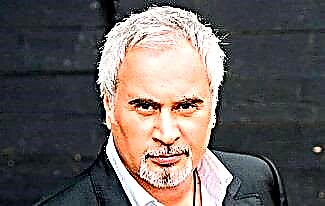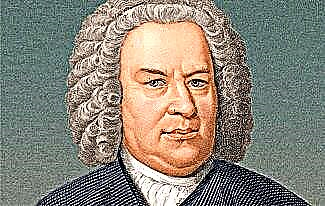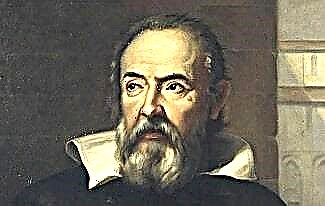Kirill (in the world Konstantin nicknamed Philosopher; 827-869) and Methodius (in the world Michael; 815-885) - saints of the Orthodox and Catholic Churches, brothers from the city of Thessaloniki (now Thessaloniki), creators of the Old Slavonic alphabet and Church Slavonic language, Christian missionaries.
There are many interesting facts in the biographies of Cyril and Methodius that will be mentioned in this article.
So, before you are short biographies of the brothers Cyril and Methodius.

Biographies of Cyril and Methodius
The eldest of the two brothers was Methodius (before his tonsure Michael), who was born in 815 in the Byzantine city of Thessalonica. 12 years later, in 827, Cyril was born (before tonsure Constantine). The parents of the future preachers had 5 more sons.
Childhood and youth
Cyril and Methodius came from a noble family and were brought up in the family of a military leader named Leo. Biographers are still arguing about the ethnicity of this family. Some attribute them to the Slavs, others to the Bulgarians, and still others to the Greeks.
As a child, Cyril and Methodius received an excellent education. It is worth noting that initially the brothers were not united by common interests. So, Methodius went to military service, and later took the post of governor of the Byzantine province, showing himself to be a skilled ruler.
From an early age, Cyril was distinguished by excessive curiosity. He spent all his free time reading books, which in those days were of great value.
The boy was distinguished by outstanding memory and mental abilities. In addition, he was fluent in Greek, Slavic, Hebrew and Aramaic. After studying at the University of Magnavr, the 20-year-old was already teaching philosophy.
Christian ministry
Even in his youth, Cyril had a wonderful opportunity to become a high-ranking official, and in the future, the commander-in-chief of the army. And yet, he abandoned his secular career, deciding to link his life with theology.
In those years, the Byzantine authorities did everything possible to spread Orthodoxy. To do this, the government sent diplomats and missionaries to areas where Islam or other religions were popular. As a result, Cyril began to participate in missionary activities, preaching Christian values to other nations.
By that time, Methodius decided to leave political and military service, following his younger brother to the monastery. This led to his being tonsured at the age of 37.

In 860, Cyril was invited to the palace to the emperor, where he was instructed to join the Khazar mission. The fact is that the representatives of the Khazar Kagan promised to accept Christianity on condition that they were convinced of the authenticity of this faith.
In the upcoming debate, Christian missionaries were required to prove the truth of their religion to Muslims and ideas. Cyril took his elder brother Methodius with him and went to the Khazars. According to some sources, Kirill managed to emerge victorious in a discussion with the Muslim imam, but despite this, the kagan did not change his faith.
Nevertheless, the Khazars did not prevent their fellow tribesmen who wanted to accept Christianity from being baptized. At that time, an important event happened in the biographies of Cyril and Methodius.
During their return home, the brothers stopped in Crimea, where they were able to discover the relics of Clement, the holy Pope, which were later transported to Rome. Later, in the life of the preachers, another significant event happened.
Once the prince of the Moravian lands (Slavic state) Rostislav turned to the government of Constantinople for help. He asked to send Christian theologians to him, who could explain Christian teachings to the people in a simple form.
Thus, Rostislav wanted to get rid of the influence of the German bishops. This trip of Cyril and Methodius went down in world history - the Slavic alphabet was created. In Moravia, the brothers have done a great educational work.
Cyril and Methodius translated Greek books, taught the Slavs to read and write and showed how to conduct divine services. Their trains dragged on for 3 years, during which they managed to achieve important results. Their educational activities prepared Bulgaria for baptism.

In 867 the brothers were forced to go to Rome on charges of blasphemy. The Western Church called Cyril and Methodius heretics, since they used the Slavic language to read sermons, which was then considered a sin.
In that era, any theological topic could only be discussed in Greek, Latin or Hebrew. On their way to Rome, Cyril and Methodius stopped in the Blatensky principality. Here they managed to deliver sermons, as well as teach the local population to book craft.
Arriving in Italy, the missionaries presented to the clergy the relics of Clement, which they had brought with them. The new Pope Adrian II was so delighted with the relics that he allowed services in the Slavic language. An interesting fact is that during this meeting Methodius was awarded the episcopal rank.
In 869, Cyril died, as a result of which Methodius himself continued to engage in missionary work. By that time, he already had many followers. He decided to return to Moravia to continue the work he had begun there.
Here Methodius had to face serious opposition in the person of the German clergy. The throne of the deceased Rostislav was taken by his nephew Svyatopolk, who was loyal to the policy of the Germans. The latter did their best to hinder the work of the monk.
Any attempts to conduct divine services in the Slavic language were persecuted. It is curious that Methodius was even imprisoned at the monastery for 3 years. Pope John VIII helped the Byzantine to be released.
And yet, in churches, it was still forbidden to hold services in the Slavic language, with the exception of sermons. It is worth noting that despite all the prohibitions, Methodius continued to secretly conduct divine services in Slavic.
Soon, the archbishop baptized the Czech prince, for which he almost suffered severe punishment. However, Methodius managed not only to avoid punishment, but also to obtain permission to conduct services in the Slavic language. An interesting fact is that shortly before his death, he managed to finish the translation of the Old Testament Scriptures.
Creating the alphabet
Cyril and Methodius went down in history primarily as the creators of the Slavic alphabet. It happened at the turn of 862-863. It is worth noting that a few years earlier, the brothers had already made their first attempts to implement their idea.
At that moment in their biography, they lived on the slope of Mount Little Olympus in a local temple. Cyril is considered to be the author of the alphabet, but which one remains a mystery.

Experts lean towards the Glagolitic alphabet, which is indicated by the 38 characters contained in it. If we talk about the Cyrillic alphabet, then it was evidently implemented by Kliment Ohridsky. However, in any case, the student still applied Cyril's work - it was he who isolated the sounds of the language, which is the most important factor in the creation of writing.
The basis for the alphabet was the Greek cryptography - the letters are very similar, as a result of which the verb was confused with the oriental alphabets. But to designate characteristic Slavic sounds, Hebrew letters were used, among which - "sh".
Death
During a trip to Rome, Cyril was struck by a serious illness, which turned out to be fatal for him. It is believed that Cyril died on February 14, 869 at the age of 42. On this day, Catholics celebrate the day of remembrance of saints.
Methodius outlived his brother by 16 years, having died on April 4, 885 at the age of 70. After his death, later in Moravia, they again began to prohibit liturgical translations, and the followers of Cyril and Methodius began to be severely persecuted. Today Byzantine missionaries are revered in both the West and the East.
Photo of Cyril and Methodius














